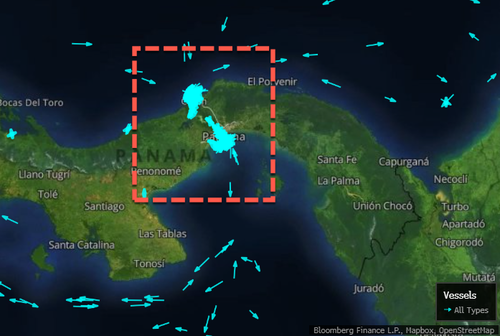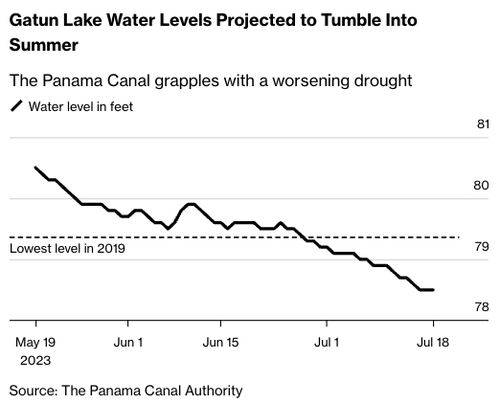
A parking lot of vessels has formed on either side of the Panama Canal as a worsening drought in the Central American country has reduced the number of ships able to sail through one of the world's most important trading routes.
The Wall Street Journal counts more than 200 vessels "currently waiting to transit, a figure that has been climbing since the canal capped daily transits to 32 last month from an average 36 under normal conditions."
Pacific and Atlantic entrances of the critical waterway are dotted with vessels. WSJ said some ships are waiting "more than 20 days" for access to the canal, forcing some carriers to reroute because of the bottleneck.
"The delays are changing by the day. Once you make a decision to go there is no point to return or deviate, so you can get stuck," said Tim Hansen, chief commercial officer at Dorian LPG, which operates more than 20 large LNG carriers.
Since our May 22 report Panama Canal Hit By Shipping Restrictions As Water Crisis Set To Worsen, the draft restriction on the canal appears to have remained at 44 feet. For some context, a 50-foot draft is considered average for the canal during normal weather conditions, though a recent drought has left Lake Gatun, the largest of two lakes that feed the canal, with extremely low water levels.

Around 6% of all global maritime traffic passes through the canal, mainly from the US, China, and Japan. During the 2016 and 2019 droughts, the draft limit went as low as 43 feet.
Retailers and energy companies use the canal for extensive trade between China and the rest of Asia and the US. The restrictions have led to a bottleneck on the waterway that forced some ship operators to reroute:
"Waiting time is one thing, but it's also the uncertainty," said Øystein Kalleklev, the CEO of Oslo-based Avance Gas.
Kalleklev added:
"The Panama Canal is a big mess these days.
"Twenty days in a queue is unprecedented at this time of the year."
Climate alarmists in the mainstream press have conveniently blamed 'climate change' for Panama's drought while ignoring El Niño, a weather pattern that brings drier conditions across much of Central America.
Dear Greta, Panama could use some of that polar ice you claim is melting at a "record rate."
"The melting of ice across the planet is accelerating at a record rate /.../ The rate of loss is now in line with the worst-case scenarios of the Intergovernmental Panel on Climate Change." https://t.co/Xn9wpWSgfF
— Greta Thunberg (@GretaThunberg) January 25, 2021
A parking lot of vessels has formed on either side of the Panama Canal as a worsening drought in the Central American country has reduced the number of ships able to sail through one of the world’s most important trading routes.
The Wall Street Journal counts more than 200 vessels “currently waiting to transit, a figure that has been climbing since the canal capped daily transits to 32 last month from an average 36 under normal conditions.”
Pacific and Atlantic entrances of the critical waterway are dotted with vessels. WSJ said some ships are waiting “more than 20 days” for access to the canal, forcing some carriers to reroute because of the bottleneck.
“The delays are changing by the day. Once you make a decision to go there is no point to return or deviate, so you can get stuck,” said Tim Hansen, chief commercial officer at Dorian LPG, which operates more than 20 large LNG carriers.
Since our May 22 report Panama Canal Hit By Shipping Restrictions As Water Crisis Set To Worsen, the draft restriction on the canal appears to have remained at 44 feet. For some context, a 50-foot draft is considered average for the canal during normal weather conditions, though a recent drought has left Lake Gatun, the largest of two lakes that feed the canal, with extremely low water levels.

Around 6% of all global maritime traffic passes through the canal, mainly from the US, China, and Japan. During the 2016 and 2019 droughts, the draft limit went as low as 43 feet.
Retailers and energy companies use the canal for extensive trade between China and the rest of Asia and the US. The restrictions have led to a bottleneck on the waterway that forced some ship operators to reroute:
“Waiting time is one thing, but it’s also the uncertainty,” said Øystein Kalleklev, the CEO of Oslo-based Avance Gas.
Kalleklev added:
“The Panama Canal is a big mess these days.
“Twenty days in a queue is unprecedented at this time of the year.”
Climate alarmists in the mainstream press have conveniently blamed ‘climate change’ for Panama’s drought while ignoring El Niño, a weather pattern that brings drier conditions across much of Central America.
Dear Greta, Panama could use some of that polar ice you claim is melting at a “record rate.”
“The melting of ice across the planet is accelerating at a record rate /…/ The rate of loss is now in line with the worst-case scenarios of the Intergovernmental Panel on Climate Change.” https://t.co/Xn9wpWSgfF
— Greta Thunberg (@GretaThunberg) January 25, 2021
Loading…





